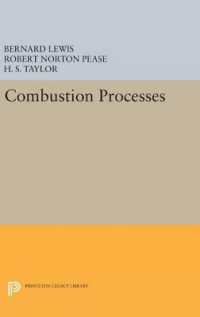- ホーム
- > 洋書
- > 英文書
- > Religion / Ethics
Full Description
In Conjectures and Controversy in the Study of Fundamentalism, W. Paul Williamson takes a critical look at the sociohistorical emergence of fundamentalism and examines how historians constructed popular, though questionable, conceptions of the movement that have dominated decades of empirical research in psychology. He further analyzes the notions of militancy and anti-modernity as valid characterizations of fundamentalism and examines whether fundamentalism, as a Christian Protestant phenomenon, is useful in labelling global forms of religious extremism and violence. In observing the lack of theory-driven research, the publication offers theories that situate fundamentalism as a social psychological phenomenon as opposed to some personal predisposition. Students and scholars of fundamentalism will discover Conjectures and Controversy in the Study of Fundamentalism to be a provocative study on the topic.
Contents
Conjectures and Controversy in the Study of Fundamentalism
W. Paul Williamson
Abstract
Keywords
1 Introduction
2 A Condensed History of Fundamentalism
2.1 Protestant Christian Fundamentalism
2.2 Other Fundamentalisms
2.3 Section Conclusion
3 The Problems of Modernity, Militancy, and Cross-cultural Application
3.1 What Is Modernity?
3.2 Are Fundamentalists Really Militant
3.3 Is the Label "Fundamentalism" Useful across Cultures?
3.4 Section Conclusion
4 Theories of Fundamentalism
4.1 Global Fundamentalism (GF) Theory
4.2 Social Identity Theory (SIT)
4.3 Intratextual Fundamentalism
4.4 Section Conclusion
5 General Conclusion
Acknowledgment
References






